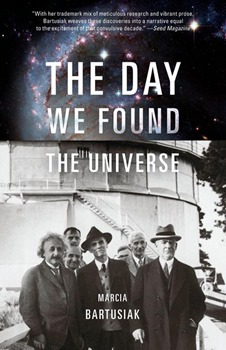Description
The riveting and mesmerizing story behind a watershed period in human history, the discovery of the startling size and true nature of our universe. On New Years Day in 1925, a young Edwin Hubble released his finding that our Universe was far bigger, eventually measured as a thousand trillion times larger than previously believed. Hubble’s proclamation sent shock waves through the scientific community. Six years later, in a series of meetings at Mount Wilson Observatory, Hubble and others convinced Albert Einstein that the Universe was not static but in fact expanding. Here Marcia Bartusiak reveals the key players, battles of will, clever insights, incredible technology, ground-breaking research, and wrong turns made by the early investigators of the heavens as they raced to uncover what many consider one of most significant discoveries in scientific history.
About the Author
Combining her skills as a journalist with an advanced degree in physics, Marcia Bartusiak (pronounced MAR-sha Bar-TOO-shack) has been covering the fields of astronomy and physics for three decades. Currently, she is a visiting professor with the Graduate Program in Science Writing at the Massachusetts Institute of Technology. Bartusiak is the author of Thursday's Universe, a layman's guide to the frontiers of astrophysics and cosmology, Through a Universe Darkly, a history of astronomers' centuries-long quest to discover the universe's composition, and Einstein's Unfinished Symphony, about the on-going attempt to detect gravity waves, the last experimental test of Einstein's theory of general relativity. All three were named notable science books by The New York Times. She also co-authored A Positron Named Priscilla, a National Academy of Sciences book on cutting-edge science. Her latest books are Archives of the Universe, a history of the major discoveries in astronomy told through 100 of the original scientific publications, and The Day We Found the Universe.Graduating in 1971 with a degree in communications from American University in Washington, D.C., Bartusiak first spent four years as a TV reporter and anchorwoman in Norfolk, Virginia. Assignments at the nearby NASA Langley Research Center sparked a love for science news, which encouraged her to enter Old Dominion University for a master's degree in physics. Her research involved the effects of radiation on materials sent into space as parts of orbiting astronomical observatories, including the Hubble Space Telescope and the International Ultraviolet Explorer.Starting her science-writing career as an intern at Science News and then as a charter member of Discover's writing staff, she continues to write about astronomy and physics in a variety of national publications. Her work has appeared in National Geographic, Astronomy, Sky & Telescope, Science, Popular Science, World Book Encyclopedia, Smithsonian, and Technology Review. For many years a contributing editor at Discover, she is now on the editorial advisory board of Astronomy magazine. She has also reviewed science books for both The New York Times and The Washington Post.Bartusiak was awarded the distinguished 2006 Andrew W. Gemant Award from the American Institute of Physics, a prize given annually by the AIP to recognize "significant contributions to the cultural, artistic, or humanistic dimension of physics," and in 2008 was elected a Fellow of the American Association for the Advancement of Science. In 1982, she was the first woman to receive the AIP Science Writing Award and won the award again in 2001 for Einstein's Unfinished Symphony. She was also a finalist in NASA's Journalist-in-Space competition. For the 1994-95 academic year, she was a Knight Fellow at the Massachusetts Institute of Technology.Marcia Bartusiak lives with her husband, mathematician Steve Lowe, and their dog Hubble in Sudbury, Massachusetts, a suburb of Boston.
